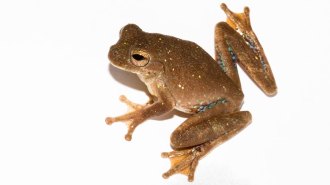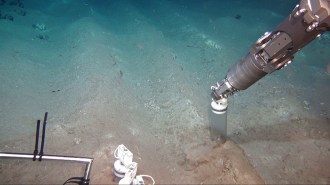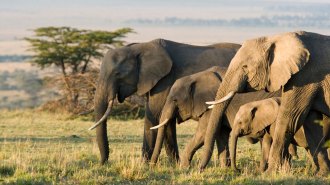Uncategorized
-
 Life
LifeWhy otters ‘juggle’ rocks is still a mystery
Shuffling pebbles really fast looks as if it should boost otters’ dexterity, but a new study didn’t find a link.
By Susan Milius -
 Psychology
PsychologyA simple exercise on belonging helps black college students years later
Black college freshmen who did a one-hour training on belonging reported higher professional and personal satisfaction years later.
By Sujata Gupta -
 Animals
AnimalsPug-nosed tree frogs use an auditory trick to evade predators and woo mates
A new study finds that some tree frogs exploit what’s known as the precedence effect to get females attention safely.
By Pratik Pawar -
 Planetary Science
Planetary SciencePlanets with hydrogen-rich atmospheres could harbor life
Lab experiments show yeast and E. coli survive and reproduce in hydrogen gas, suggesting new environments to seek alien life.
-
 Oceans
OceansDeep-sea mining may damage underwater ecosystems for decades
Microbe communities in the seabed off Peru still haven’t fully recovered from being disturbed by a deep-sea mining experiment 26 years ago.
-
 Physics
Physics50 years ago, superconductors started feeling the pressure
Today, high-pressure superconductors are a hot topic. 50 years ago, scientists were just starting to explore the possibilities.
-
 Animals
AnimalsWhy mammals like elephants and armadillos might get drunk easily
Differences in a gene for breaking down alcohol could help explain which mammals get tipsy.
By Susan Milius -
 Health & Medicine
Health & MedicineSome existing drugs might fight COVID-19. One may make it worse
Maps of interactions between coronavirus proteins and host proteins point to drugs that may slow viral growth, but cough medicine may stimulate growth.
-
 Physics
PhysicsA newfound superconducting current travels only along a material’s edge
In a first, scientists spot electricity flowing without resistance on the rim of a topological superconductor.
-
 Earth
EarthGreenland and Antarctica are gaining ice inland, but still losing it overall
Inland ice accumulation is not enough to counteract the amount of ice melting off Antarctica and Greenland into the oceans, satellite data show.
-
 Astronomy
AstronomyThe sun is less magnetically active than similar stars, and we don’t know why
Why our star seems so different from its stellar kin is a mystery.
-
 Anthropology
Anthropology16th century skeletons suggest the slave trade brought some diseases to Mexico
Slaves buried in a 16th century grave in Mexico had hepatitis B and yaws, suggesting the slave trade helped spread some versions of those diseases.
By Bruce Bower